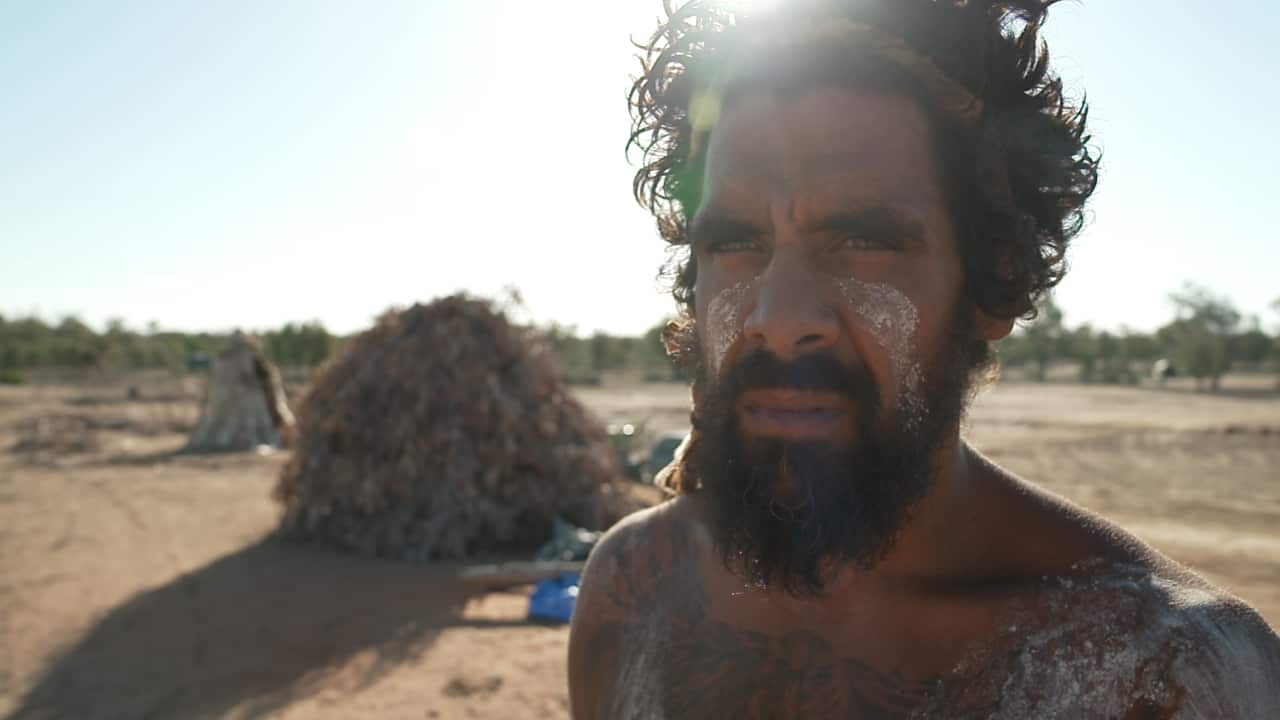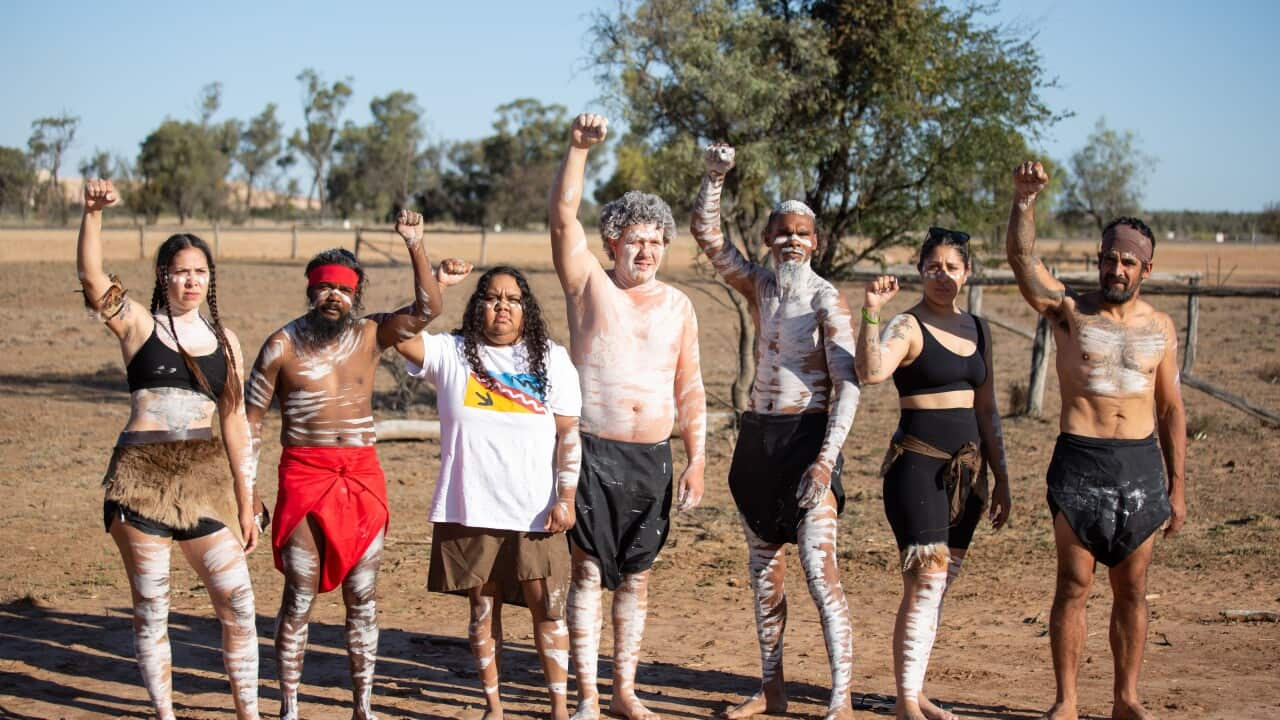A patch of bare and dusty land in one of Queensland’s most remote stretches has been Coedie McAvoy’s temporary home for the past two months.
He’s been determinedly conducting a cultural sit in - participating with family in a continuous cultural ceremony in protest at a massive growing coal mine a few kilometres away.
Painted in traditional ochre, the men and women perform the Waddananggu (talking) ceremony and take turns occupying a ceremonial circle of stones.
They tend to a fire, which has now burned continuously for 70 days.
“We originally set (the ceremony) up to talk to neighbouring tribes,” Mr McAvoy tells NITV’s The Point.
“We thought we’ll expand out to tribes further along. We also set the circle up to bring non-Indigenous people into a ceremony.” The group spend their time building yumbas (shelters) from branches, walking on their Country, and trying to escape the relentless heat in the middle of the day.
The group spend their time building yumbas (shelters) from branches, walking on their Country, and trying to escape the relentless heat in the middle of the day.

Coedie McAvoy and his family have been performing ceremony at this camp for over two months. Source: NITV The Point
Vital to the ceremony is the presence of a Wangan and Jagalingou person in the circle at all times.
Mr McAvoy is joined by his sister Miesha McAvoy, and nephews Grant Aloiai and Nathan Baira, as well as supporters from across Australia - both First Nations and non-Indigenous people.
Mr McAvoy says he has gained strength from this support.
“As long as we’re here (and) this fire is still burning, and there's one W&J person in here, the ceremony lives on,” he says.
“And as long as the ceremony lives on, it gives power and strength to other tribes to stand up and fight back from mining companies that are doing exactly the same thing as they did to our people.”
An ongoing battle
It’s not a new fight. The Wangan and Jagalingou man has dedicated the past decade to opposing mining on his Country in central Queensland.
He has been butting heads with coal-mining giant Adani, now known as Bravus, over their massive Carmichael mine project in the Galilee Basin. The protest site is inside Adani’s vast mine lease. It’s three hours drive to the nearest town, and far from the public eye.
The protest site is inside Adani’s vast mine lease. It’s three hours drive to the nearest town, and far from the public eye.

The group has kept the fire burning for the entire time they've been camped on the mining lease. Source: NITV The Point
But every move is watched. A mine vehicle is stationed just a short distance from the camp.
Police have previously removed Mr McAvoy from the area before, alongside his father Adrian Burragubba.
In August 2020, Queensland Police (QPS) moved Mr Burragubba and other Traditional Owners off a pastoral lease where they had been performing ceremony.
After lodging a complaint with the human rights commission, Mr Burragubba received a from QPS.
This time though, things seem different.
Mr McAvoy says police have indicated they’ll not move him or other Traditional Owners off the mining lease.
There are detractors within his own community. He say not everyone is supportive of his actions, and the community has been divided over the mine.
Bravus has a formal land-use agreement with Wangan and Jagalingou people, which is opposed by some Traditional Owners, including Mr McAvoy and his family.
Adani’s Bravus has labelled the camp as “an unauthorised protest camp” that has been “occupied by numbers of people who are anti-fossil fuel activists”. “We question the integrity of the anti-fossil fuel lobby group who are using this camp as a vehicle for anti-fossil fuel activism,” a company statement says.
“We question the integrity of the anti-fossil fuel lobby group who are using this camp as a vehicle for anti-fossil fuel activism,” a company statement says.

The mine site can be seen from the group's camp. Source: NITV The Point
“Importantly, Mr Burragubba, his son Mr McAvoy and their minority faction do not represent the majority of Native Title Claimants for the Clermont and Belyando People of the Wangan and Jagalingou region and they are not authorised representatives of the majority of Native Title claimants.”
The miner says it acknowledges “that individual Wangan and Jagalingou community members may have their own personal views” about the mine, and that they’re continuing to engage with Traditional Owners who are “formally appointed to represent their community” under the Indigenous Land Use Agreement and Cultural Heritage Management Plan.
Mr McAvoy and his family say they’re particularly concerned about the future of a sacred spring site, called Doongmabulla Springs and a stone-tool making site in the mine area.
They’re also worried about the changing landscape throughout their Country.
“Over the years, it's been a bit hard seeing all the Country,” Grant Aloiai says. “Big, beautiful trees have gone and all the water - all the sacred water - that's special.
“Big, beautiful trees have gone and all the water - all the sacred water - that's special.

Grant Aloiai said "sacred" water on his ancestral Country had to be protected. Source: NITV The Point
“All the springs, they're special. They have to be protected - they're the reason we can breathe and talk and walk.”
Miesha McAvoy echoes Mr Aloiai’s concerns, saying she felt hurt when she first saw the mine activity.
“When I got here, I couldn't sleep, there was just this negative energy surrounding me,” she explains.
“I had to be smoked almost every day because it was just surrounding me.
“But I think the longer that we've stayed out here the more protected our little camp is starting to feel. Every single time we do these smokings, it's pushing away all the bad spirits and energy.” Bravus says the company “categorically rejects claims that the springs are in danger”.
Bravus says the company “categorically rejects claims that the springs are in danger”.

After months spent at the site, Miesha McAvoy says her initial anxiety has disappeared, replaced by connection to Country. Source: NITV The Point
“The approvals for the Carmichael Mine include multiple mechanisms to protect and monitor the Doongmabulla Springs, which lie more than 11km away from the mining area, outside the mining lease,” it says.
“CSIRO and Geoscience Australia independently assessed the Groundwater Dependent Ecosystems Management Plan and the Groundwater Management and Monitoring Plan for the mine before they were approved to ensure the safeguards that we are implementing to protect groundwater and the springs are effective.
“This includes a network of more than 100 monitoring bores to track underground water levels.”
“Bravus will not take water from the Doongmabulla Springs. The Rewan Formation (250 – 300 metres of claystone) separates the source of water for the Doongmabulla Springs and that of the mine.” Back at the camp, emotions are mixed.
Back at the camp, emotions are mixed.

Part of life on the camp is constructing yumbas for shelter. Source: NITV The Point
There’s a sense of pride at being on Country, a feeling that each person at the camp -whether related by blood or not - is family.
But an underlying sense of sadness pervades.
Mr Aloiai wishes he could be on Country under more positive circumstances.
“I love being on Country and I feel connected,” he explains.
“I feel safe, I feel at home and having to be out here to stop a mine company from destroying it, that breaks my heart.” Nathan Baira says it is his responsibility to continue to be on Country, and protect what has been left to him by his ancestors.
Nathan Baira says it is his responsibility to continue to be on Country, and protect what has been left to him by his ancestors.

“I encourage everybody, all tribes to do the same thing that we're doing,” said Nathan Baira. Source: NITV The Point
“Our people were here since the first sunrise,” he says.
“They have been maintaining this land for a long time so that is our job. We don't just give up now.
“It might be 2021, but hey, our people left that there for us and we got to carry that legacy on.
“We can do this, and ancestors are with us.”
They all hope their struggle will inspire others to fight for their own Country, wherever that may be.
“I encourage everybody, all tribes to do the same thing that we're doing,” Mr Baira says.
“Stand up, speak, up, you have a voice so keep doing your Waddananggu, keep speaking your language.”











